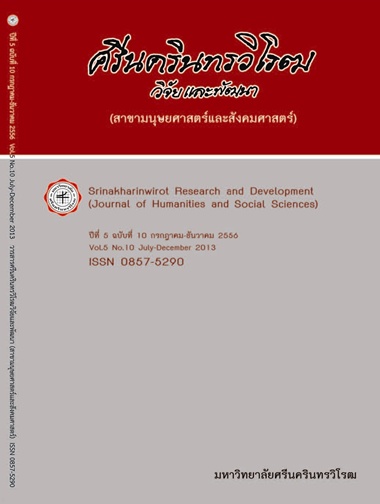การติดตามประเมินผลการดำเนินงานตามโครงการแผนชุมชนพึ่งตนเองตามแนวปรัชญาเศรษฐกิจพอเพียงของกรุงเทพมหานคร กรณีศึกษาชุมชนแออัดบุญเหลือ 2 เขตบางซื่อ
Keywords:
evaluation, self-reliance project with special reference to self-sufficiency economy, slum areasAbstract
บทคัดย่อ วัตถุประสงค์ของการประเมินโครงการนี้มี 3 ประการ คือ 1) เพื่อศึกษาผลการดำเนินงานตามวัตถุประสงค์ของโครงการในมิติของบริบททั่วไป ปัจจัยนำเข้า กระบวนการดำเนินงาน ผลผลิต ผลลัพธ์ และผลกระทบโดยภาพรวมของโครงการ 2) เพื่อศึกษากระบวนการขับเคลื่อนการพัฒนาชุมชนไปสู่การพึ่งตนเองที่เหมาะสมในบริบทชุมชนแออัดบุญเหลือ 2 เขตบางซื่อ กรุงเทพมหานคร และ 3) เพื่อศึกษาปัญหาอุปสรรคและข้อเสนอแนะต่อแนวทางในการดำเนินงานโครงการ
ผลการประเมินโครงการพบว่า ปัจจัยด้านบริบททั่วไปและด้านกระบวนการดำเนินงานส่งผลต่อการจัดทำแผนชุมชนพึ่งตนเองในภาพรวมระดับปานกลาง ส่วนปัจจัยนำเข้าที่ก่อให้เกิดความสำเร็จในการจัดทำแผนชุมชนพึ่งตนเองคือ ผู้นำและคณะกรรมการชุมชน คณะทำงานจัดทำแผนชุมชนพึ่งตนเองมีผลในระดับมาก ในด้านผลผลิตและผลลัพธ์พบว่าโครงการได้ช่วยพัฒนาและส่งผลให้ชุมชนนำปรัชญาเศรษฐกิจพอเพียงมาประยุกต์ใช้ในชีวิตประจำวันทำให้มีการเปลี่ยนแปลงที่ดีขึ้น นอกจากนี้กระบวนการขับเคลื่อนการพัฒนาชุมชนในบริบทชุมชนแออัดบุญเหลือ 2 เขตบางซื่อ กรุงเทพมหานคร พบว่าปัจจัยด้านบริบททั่วไปของการมีสภาพเป็นชุมชนแออัดที่โหยหาความปลอดภัยของชีวิตและทรัพย์สิน เนื่องด้วยการมีสภาพแวดล้อมที่คับแคบบ้านเรือนติดกันมีฐานะทางเศรษฐกิจต่ำ เป็นแรงผลักให้กระบวนการดำเนินงานตามโครงการเป็นไปได้ด้วยดีทั้งปัจจัยนำเข้า กระบวนการดำเนินงาน ผลผลิต และผลลัพธ์ ส่วนผลกระทบพบว่าการเปิดเวทีให้ตัวแทนชุมชนแลกเปลี่ยนเรียนรู้กับคณะ ทำงานจัดทำแผนชุมชนในบริบทชุมชนอื่นๆ ที่แตกต่างกัน ส่งผลให้เกิดความเข้าใจนำไปสู่การแก้ไขปรับปรุงแผนให้มีความชัดเจนถูกต้องมากยิ่งขึ้น ส่วนปัญหาและอุปสรรค คือความเร่งด่วนของโครงการทำให้มีเวลาการเตรียม การจำกัด การประสบอุทกภัยปี พ.ศ. 2554 ทำให้การดำเนินโครงการล่าช้าไม่ต่อเนื่อง ร้อยละ 50 ของโครงการยังไม่ได้ดำเนินการเสนอให้คณะกรรมการพิจารณา รวมทั้งการไม่เข้าใจในระบบการจัดซื้อจัดจ้างวัสดุราคากลาง
Abstract
The purposes of this project were 1) to evaluate the project with regards to the dimensions of context, input, process, product, outcome, and the overall impact of the project; 2) to study the community development process to self-reliance in Bangkok slum areas; and 3) to study problems and difficulties and to seek for suggestion on the community development plan.
The findings reveals that the overall factors of contextual dimension and implementation process influenced the development of self-reliance community plan were found in the average. For the input process, the main factors influenced success of the plan at a high level were leaders, community committee, and operational staff. The product and outcomes were proved that they able to improve qualities of the communities and derive the sufficiency economy philosophy to their daily life. The movement process of community development was found satisfactory in nearly all aspects since people in the slum areas of Boonlue Community 2 in Bang-sue district, Bangkok themselves are also longing for the comfort in basic needs, security in life and property, and better economic status. However, the impact of this plan indicated that the forum or meeting should be arranged to allow people to learn and to exchange ideas among the planning committee of other different communities. The problems and difficulties of time force on the urgency of the programs, the 2554 B.E. flooding, and the lack of understanding in employing-purchasing system, and 50 percent of the programs developed had been delayed for the approval of the community committee.
Downloads
Downloads
Published
How to Cite
Issue
Section
License
Srinakharinwirot Research and Development Journal of Humanities and Social Sciences is licensed Under a Creative Commons Attribution-NonCommercial-NoDerivs 4.0 International (CC-BY-NC-ND 4.0) License, Unless Otherwise Stated. Please Read Journal Policies Page for More Information on Open Access, Copyright and Permissions.



